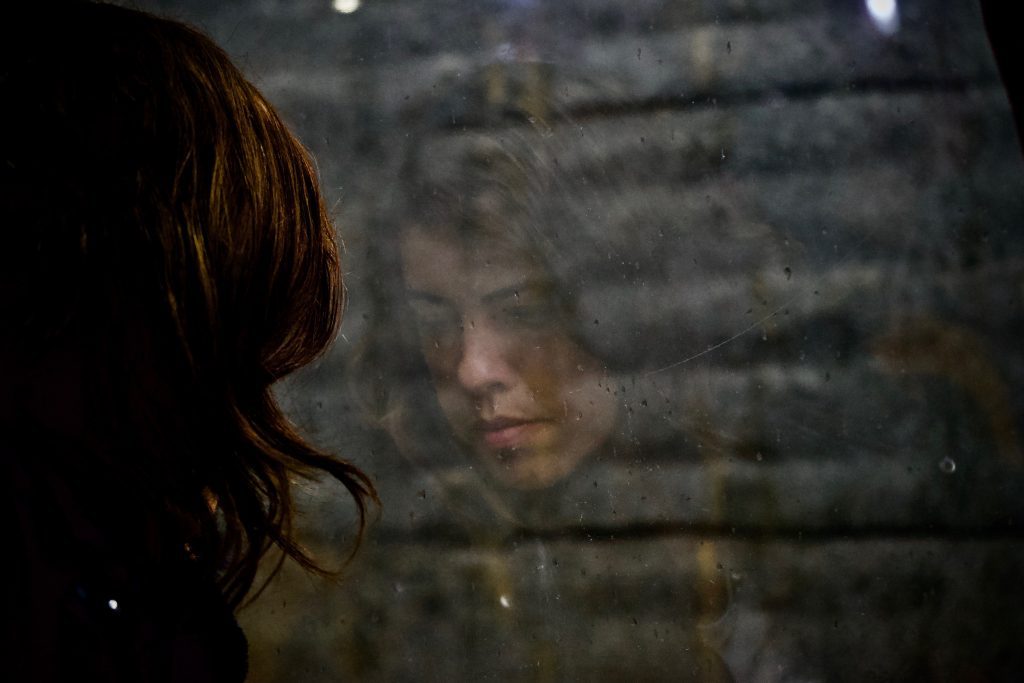“This isn’t real. Stop,” I think to myself, seemingly a million times a night, trying to control my breath while lying in bed. “He’s upstairs, safe, and in his crib, not under the pounding wheels of a train.” I glance at the video monitor showing my toddler sound asleep. It helps a little, but not completely.
This is when the fight between head and heart begins, but in this case, literally. My heart’s pounding, racing, all thanks to the cycle of my thoughts. I should be sleeping, as my husband inadvertently reminds me with his slow, heavy and sleepy breathing. I’ve always been needlessly jealous of his lack of anxiety about our now 19-month-old.
I try to pace my breathing and even turn on The Joy of Painting with Bob Ross—one of my nighttime favorites during these panic attacks. But, sometimes, instead of relief, my mind gets “creative,” and I usually begin panicking about other ways my son could die. Maybe his car seat will fly out of my car in an accident; maybe I’ll trip and fall down the stairs while holding him; maybe someone will steal him out of his bedroom at night while I’m asleep and I’ll never see him again.
Some women may wonder what’s wrong with me. But, I know there are many other women feeling understood. And that’s because, according to a study published by Journal of Affective Disorders, this paralyzing sense of worry affects about 17 percent of early postpartum women.
But what about when you realize you’re past those early months of postpartum, and the worrisome thoughts haven’t left? This is where I’ve found myself. This has been the subject of many late-night messages between myself and a close group of mom friends for a while.
So, let’s break down the different elements of this mental illness.
Postpartum depression is different from postpartum panic attacks, which is a variation of postpartum anxiety. That fact alone gave me anxiety when I did research, as I thought to myself, “Well, what exactly do I have, then?”
In August of 2018, very shortly after my son was born, I began experiencing these intrusive thoughts and panic attacks. At first, they were accompanied by what my doctor called the “baby blues,” which, according to American Pregnancy, is the least severe form of postpartum depression and disappears shortly after birth. It seemed pretty severe to me, though.
And that depressive state lingered longer than I’d have liked, but the anxiety never left. I never felt any anger or resentment toward my baby, which is a widely accepted (and televised) symptom of postpartum mental health problems. In fact, my experience has always been the exact opposite, as I’m obsessed with his health, safety, and overall wellbeing. I’m not embarrassed by it. It’s just hard to live with. And I don’t want him to resent me for it one day.
The US National Library of Medicine published results in 2018 of 14 studies on women with postpartum anxiety disorders: postpartum generalized anxiety disorder (GAD), postpartum panic disorder (PD), obsessive compulsive disorder (OCD) and post-traumatic stress disorder (PTSD). According to the results: “Loss, frustration, and guilt, accompanied by physical symptoms of tension, were some of the experiences identified across studies. Most women suffered from more than one anxiety disorder, in addition to postpartum depression.”
And, according to Women’s Health, serotonin uptake inhibitors (Zoloft, for example) are the most commonly prescribed medications for women suffering from PPD. Whereas women suffering from both PPD and a postpartum anxiety disorder are urged to seek therapy and are also often prescribed anxiolytic medications, such as Klonopin, to help with sleep disturbances and to ease anxious thoughts. So the general veil of “postpartum depression” needs to be lifted so we can assess ALL facets of women’s mental health after childbirth and treat them as needed.
The crippling panic attacks have eased over the past year and a half, but I’m just not sure if they will ever go away entirely. I wonder if I’ll ever be able to let my son ride a roller coaster or drive a car without entering a pure state of panic. But for now, I’ll keep working on my approach to let the intrusive and near-paralyzing thoughts leave my mind without affecting my own wellbeing.













